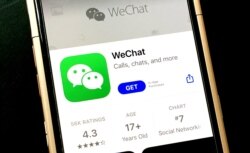A mobile application that gives users in China access to social media sites banned by the government has disappeared a day after its release.
The app is called Tuber. It is designed for the Android mobile operating system. Tuber is supported by Chinese cybersecurity software company Qihoo 360.
A reporter at the state-run Global Times tweeted about its launch on Oct. 9, “a great step for China's opening up.” A day later she added, “Update: #Tuber is no longer on the Huawei App Store this afternoon.”
The app offered users limited access to websites such as YouTube, Facebook and Google. It had about 5 million downloads after its release. A search for the app’s website gave no results when VOA looked this week. It is unclear whether the government ordered the app to be removed.
Choice: real or illusion?
Before it disappeared last Saturday, Chinese users praised the app for its ability to visit banned websites. Several stories introducing Tuber were widely read last Friday on China's popular app WeChat before they were taken down.
Tuber had a similar logo to YouTube’s. Its main page offered YouTube videos. Another part of the site permitted users to go to Western websites banned in China.
However, users noticed that the browser did not search everything. Sensitive political issues, such as the recent Hong Kong protests, were blocked, Reuters reported. YouTube requests for politically sensitive keywords such as “Xi Jinping” returned no results on the app, said TechCrunch.
Some terms in the users’ agreement also raised concerns. The terms said it could suspend users’ accounts and share their information with security officials if they break the rules. That means using or sharing content considered to be rumors, dangerous to national security, against local laws or harmful to social order. The terms also let security officials collect user information without their permission.
Users of the app had to register through a Chinese phone number which is tied to a person’s real identity and permits position tracking.
Since its removal last Saturday, those who downloaded the app received a message that Tuber is "undergoing a system upgrade," TechCrunch said.
Not the first attempt
Sarah Cook is a researcher on China, Hong Kong and Taiwan at Freedom House, a rights group. She told VOA the availability of the new app for a short time might be a way for the Chinese government to create the “illusion of choice” to users.
“By facilitating and controlling the access, the Chinese Communist Party is able to ensure that their browsing indeed stays within approved limits,” she said.
Tuber is not the first browser in China that attempted to provide Chinese citizens with some access to the Western internet. About a year ago, there was a similar effort made with a mobile browser called Kuniao that was approved by China’s Ministry of Industry and Information Technology. But it was taken down in a few days.
A Chinese blogger who has been following China’s Great Fire Wall and who requested not to be identified told VOA that he was not surprised. He said the government wants people to use such sites instead of independent VPNs.
“But when they've become overly popular, the government will…intervene,” the blogger said. He added that he would not be surprised to see similar tools coming out soon.
I’m Mario Ritter, Jr.
Adam Xu reported this story for VOA News. Mario Ritter Jr. adapted it for VOA Learning English. Hai Do was the editor.
_______________________________________________________________
Words in This Story
access –n. permission or the right to enter, get near or make use of something
facilitate –v. to make something easier or to help cause something to happen
illusion –n. something that looks or seems different from what it is, something that is false or not real but seems to be true or real
logo –n. a symbol (picture or sign) that is used to identify a company and that appears on its products
browser –n. a computer program that is used to look for information on the internet
rumors –n. information or a story that is passed from person to person but that has not been proved to be true
intervene –v. to become involved in something in order to have an influence on what happens
We want to hear from you. Write to us in the Comments section, and visit our Facebook page.






